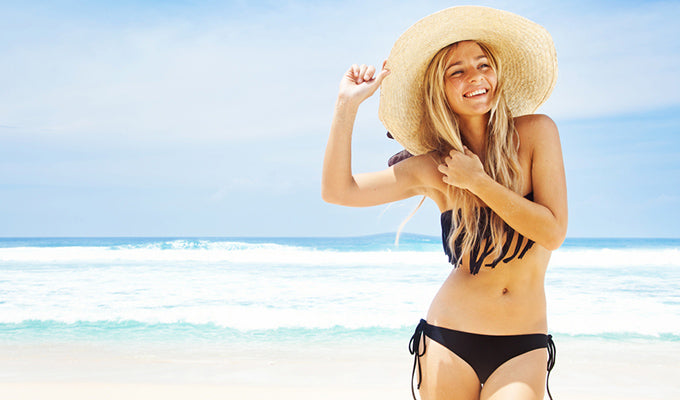If your summer is going as well as mine, you have stocked up on palm-tree-printed totes, floppy hats, and pretty cotton caftans – because we, my friends, are headed to the beach! (Or the pool, anywhere there’s a lounge chair – I’m not really picky.)
Whether you are fair or olive, I’m sure that it has crossed your mind to acquire what we beach bunnies call a base tan. Never heard of it? A base tan has been rumored to protect your skin from unsightly (and uncomfortable!) sunburn on vacation by upping your skin’s natural SPF. But if it sounds too good to be true, it’s probably because it is.
It turns out that a base tan is no substitute for solid sun protection consistently reapplied, especially if you are partaking in the ocean. And while it may be tempting to darken up before you jet off, the risk of long-term tanning and additional sun exposure far outweigh the unproven benefits of a base tan.
Still tempted?
Your best bet is to find an ultra-luxurious SPF that moisturizes and protects your skin, one that brings out the natural tones of your skin while providing sun protection of SPF 20 or greater. The best choices have natural ingredients while giving you full-body protection against the sun.
If you continue to be envious of your darker-toned ladies who can romp around without SPF, be fair warned that tanned or naturally dark skin only has an actual SPF of about 4. In essence, exposing your skin to additional sun damage is a great risk and really not terribly effective. I think we can all agree that a bottle of SPF 4 isn’t exactly a bargain, and your skin is still exposed to carcinogenic effects and premature aging.
So remember this: Pale skin is beautiful and sun-kissed skin is far from legitimate protection. In fact, any and all tanning is just a form of sun damage that can lead to winkles, spots, and worse.
But how do you choose the right SPF number? It’s simple! Look for a high-quality product with natural ingredients that blocks both UVA and UVB rays. While UVA rays don’t necessarily cause sunburn like UVB rays do, they do penetrate the skin and can cause wrinkles.
The number next to the SPF is a measure of the minutes it would take you to sunburn if you were not wearing sunscreen as opposed to the time it would take with sunscreen on. So if you normally burn in the sun after 15 minutes, you should go with an SPF that is 15 or higher to protect your skin the fullest.
Happy sun bathing, beauties!
Should You Get a Base Tan This Summer?
By: Yonka Paris USA

Connect with Us
Recent Articles
-
70 YEARS OF EMPOWERING WOMEN
March 8 will be International Women's Day all...
-
Earth Day: A Yon-Ka Paris Tradition Of Giving Back
To celebrate upcoming earth day, Catherine and Francoise...
-
Celebrate Mother’s Day with Yon-Ka Paris and Get Rewarded
Mothers give us unconditional love all year round...
-
How to Treat Skin After a Sun Damaged Summer
With summer quickly coming to an end and...
-
Treatment Spotlight: Le Grand Classique
We already know that removing makeup at night, proper...













